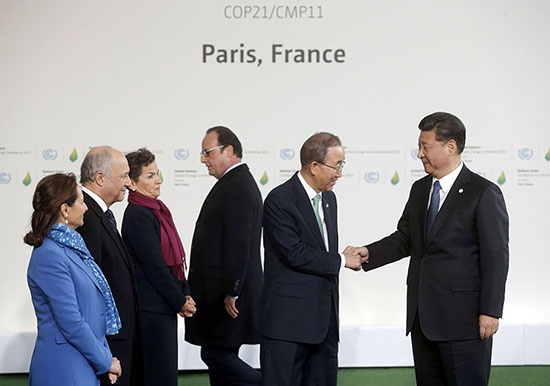Prepare now for another major El Nino
Updated: 2015-12-11 08:57
By Axel Van Trotsenburg(China Daily)
|
||||||||
 |
|
United Nations Secretary General Ban Ki-moon, accompanied by French Ecology Minister Segolene Royal (L), French Foreign Affairs Laurent Fabius (2ndL), Secretary of the UN Framework Convention on Climate change Christiana Figueres(3rdL) and French President Francois Hollande (3rdR) , welcomes Chinese President Xi Jinping as he arrives for the opening day of the World Climate Change Conference 2015 (COP21) at Le Bourget, near Paris, France, November 30, 2015. [Photo/Agencies] |
The latest cyclical warming of Pacific Ocean waters, first observed centuries ago and formally tracked since 1950, began earlier this year and has already been felt across Asia, Africa and Latin America.
Weather experts predict this El Nino will continue into the spring of 2016 and could wreak havoc, because climate change is likely to exacerbate the intensity of storms and flooding in some places and of severe drought and water shortages in others. El Nino's impacts are global, with heavy rain and severe flooding expected in South America and scorching weather and drought conditions likely in the Horn of Africa region.
The risk is especially great for East Asia-Pacific countries that are highly vulnerable to altered weather patterns because of climate change. This year will likely be the hottest ever recorded, increasing the El Nino effect caused by weakened trade winds that fail to push warmer Pacific Ocean waters to the west.
We know what the potential effects might be. In 1997 and 1998, the strongest El Nino on record led to the deaths of 23,000 people from natural disasters, increased poverty rates by 15 percent in some countries and cost governments up to $45 billion owing to severe storms, droughts and other effects.
Such a global challenge calls for a global response - with coordinated efforts by governments, international institutions such as the World Bank, relief agencies and communities - to minimize the death and destruction from natural catastrophes while building more resilient societies.
- Global health entering new era: WHO chief
- Brazil's planning minister steps aside after recordings revelation
- Vietnam, US adopt joint statement on advancing comprehensive partnership
- European border closures 'inhumane': UN refugee agency
- Japan's foreign minister calls A-bombings extremely regrettable
- Fukushima impact unprecedented for oceans: US expert

 Stars of Lijiang River: Elderly brothers with white beards
Stars of Lijiang River: Elderly brothers with white beards
 Wealthy Chinese children paying money to learn British manners
Wealthy Chinese children paying money to learn British manners
 Military-style wedding: Fighter jets, grooms in dashing uniforms
Military-style wedding: Fighter jets, grooms in dashing uniforms
 Striking photos around the world: May 16 - May 22
Striking photos around the world: May 16 - May 22
 Robots help elderly in nursing home in east China
Robots help elderly in nursing home in east China
 Hanging in the air: Chongqing holds rescue drill
Hanging in the air: Chongqing holds rescue drill
 2.1-ton tofu finishes in two hours in central China
2.1-ton tofu finishes in two hours in central China
 Six things you may not know about Grain Buds
Six things you may not know about Grain Buds
Most Viewed
Editor's Picks

|

|

|

|

|

|
Today's Top News
Liang avoids jail in shooting death
China's finance minister addresses ratings downgrade
Duke alumni visit Chinese Embassy
Marriott unlikely to top Anbang offer for Starwood: Observers
Chinese biopharma debuts on Nasdaq
What ends Jeb Bush's White House hopes
Investigation for Nicolas's campaign
Will US-ASEAN meeting be good for region?
US Weekly

|

|







